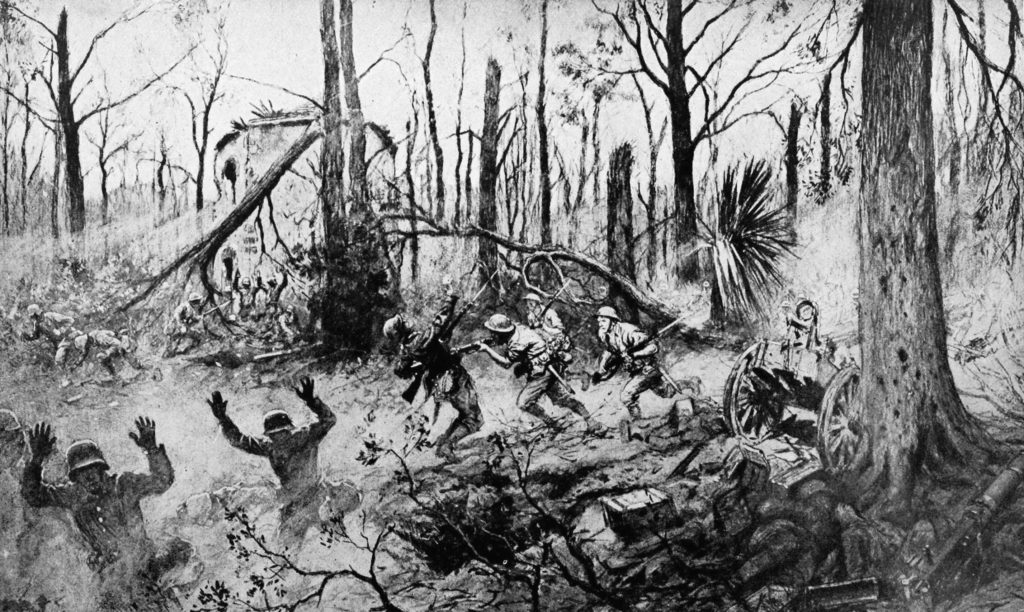Floyd Gibbons (1887-1939) was a war correspondent for the Chicago Tribune whose reporting turned Belleau Wood into legend. Badly wounded himself in the first days of the battle, he filed his most famous dispatch from a hospital bed. It is a story about immigrants: Most of the U.S. Marines who fought at Belleau Wood were native-born Americans, but most were the sons of immigrants. Here is an excerpt from Andrew Carroll’s My Fellow Soldiers: General John Pershing and the Americans Who Helped Win the Great War, at pp. 225-227 (edited for brevity):
“By June 8, the fight for Belleau Wood was still raging, and Gibbons was going crazy not being there to cover it in person. But with the help of a Marine major named Frank E. Evans, who relayed information to him in his hospital bed, Gibbons was able to [write his story]. …
‘A small platoon line of Marines lay on their faces and bellies under the trees at the edge of a wheat field …. Two hundred yards across that flat field the enemy was located in the trees. … The bullets nipped the tops of the young wheat and ripped the bark from the trunks of the trees three feet from the ground on which the Marines lay. … An old gunnery sergeant commanded the platoon …. As the minute for the advance arried, he arose from the trees first and jumped out onto the exposed edge of that field …. Then he turned to give the charge order to the men of his platoon — his mates — the men he loved. He said: “COME ON, YOU SONS-O’-BITCHES! DO YOU WANT TO LIVE FOREVER?”‘
“Dan Daly, the forty-four-year-old Marine who exhorted his young comrades to advance, survived the battle …. One thousand other Marines did not. … For Gibbons, some of the greatest testimony regarding the Marines’ grit and determination at Belleau Wood came from the Germans themselves. ‘The individual soldiers are very good,’ Gibbons quoted from an intercepted intelligence report:
‘They are healthy, vigorous, and physically well-developed men …. Only a few of the troops are pure American origin; the majority is of German, Dutch, and Italian parentage, but these semi-Americans, almost all of whom were born in America and never have been in Europe before, fully feel themselves to be true born sons of their country.’
“Gibbons observed this same sense of national unity in the hospital where he was recovering. ‘There were fourteen wounded American solder soldiers in my ward, Gibbons wrote.
‘There was an Irishman, a Swede, an Italian, a Jew, a Pole, one man of German parentage, and one man of Russian extraction. All of them had been wounded at the front and all of them now had something nearer and dearer to them than any traditions that might have been handed down to them from a mother country — they had fought and bled and suffer for a new country, their new country.
‘Here in this ward was the new melting pot of America. Not the melting pot of our great American cities where nationalistic quarters still exist, but a greater fusion process from which these men had emerged with unquestionable Americanism. They are the real and new Americans — born in the hell of battle.'”
Donald Trump’s grandfather was an immigrant who made his fortune in Seattle and the Klondike during Gold Rush days. His wife, our current First Lady, is an immigrant. Every person on this continent is a descendant of immigrants, the earliest of whom came here approximately 16,000 years ago. It is fair to ask: What is an American, and what makes a person an American?
Most people would say citizenship makes you an American. But not all of our citizens started out as Americans. As noted above, in the beginning, none of them did. We, or our ancestors, all originally came from somewhere else.
Floyd Gibbons, one of the most famous journalists of his time, helped American newspaper readers of 100 years ago understand what makes someone an “American.” It’s not where you or your parents were born. It’s about a desire to be a part of what this country is, and bonds forged in various ways — sometimes in battle, sometimes in other ways.
This is what Trump doesn’t understand about us. His concept of America is oversimplistic. That’s why he fails to grasp that someone who just arrived from Mexico or Guatemala or wherever has the potential to become just as American as you and I are, or he is. It has nothing to do with skin color, national origin, language, or religion. It’s about the values we share and our mutual willingness to defend them. As the U.S. Marines — a polyglot of nationalities and immigrants’ sons — did in Belleau Wood a century ago.
